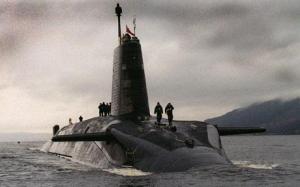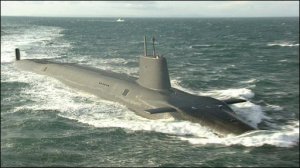The people of Scotland are just sixteen days away from voting to decide if they will remain as part of the United Kingdom or leave the Union that has been in place since 1707 as the Kingdom of Great Britain.
This post will look at how independence would affect Trident – the UK’s nuclear weapons programme that is based in Scotland, in the River Clyde.
The United Kingdom has four Vanguard-class submarines based at Her Majesty’s Naval Base Clyde at Farslane, on the west coast of Scotland. These submarines make up Britain’s nuclear weapons programme, which is known as Trident. According to government documents at least one of the nuclear-armed submarines has always been on patrol somewhere in the world’s oceans since 1969. This is in order to assure that if the UK came under nuclear attack from a foreign aggressor she would be able to launch a retaliatory strike from the submarine. This concept is known as mutually assured destruction.
The current trident system is coming to the end of its working life and in 2007 the House of Commons voted in favour of replacing it. A decision on the exact nature of the replacement has been deferred until after 2016 as the current coalition government are unable to agree on how exactly to continue the UK’s nuclear weapons programme – but all three of the main UK parties agree that it does need to be replaced.
The Scottish National Party has stated in its manifesto that an independent Scotland would get rid of nuclear weapons – meaning that if Scotland votes ‘Yes’ on 18th September the SNP is likely to demand the removal of Trident from Scottish waters. In the Scottish government’s prospectus for independence, Scotland’s Future, they state that, “negotiations on the maintenance of shared capabilities would not include nuclear weapons. This Scottish government would make early agreement on the speediest safe removal of nuclear weapons a priority. This would be with a view to the removal of Trident within the first term of the Scottish Parliament following independence.” The Scottish National Party have said that it is wrong both economically and morally to keep Trident, saying it is, “an affront to basic decency with its indiscriminate and inhumane destructive power.”
The Royal United Services Institute has said that removing trident would be very difficult, but “not impossible”. There are a huge number of difficulties associated with the possibility of having to move the nuclear programme from Farslane and the BBC have said that, ‘Given the difficulties associated with moving the nuclear programme from Farslane rather than dismantling it, it is possible that Scottish independence would have the practical effect of forcing the UK to give up sea-based nuclear weapons entirely.’ The BBC also quote Andrew Dormon in a paper for the Royal Institute of International Affairs, in which he argues that such an outcome would “profoundly change the composition and functioning of the Security Council, significantly diminish UK’s standing, alter the balance of power in Europe and increase the shift of power from the North Atlantic to the Pacific”.
The vote on 18th September will no doubt hold enormous consequences in terms of education, the NHS, childcare and the economy amongst others, but it is clear from the potential issues that may arise with the United Kingdom’s nuclear programme that defence is also going to be affected in a huge way, regardless of the outcome of the referendum.



